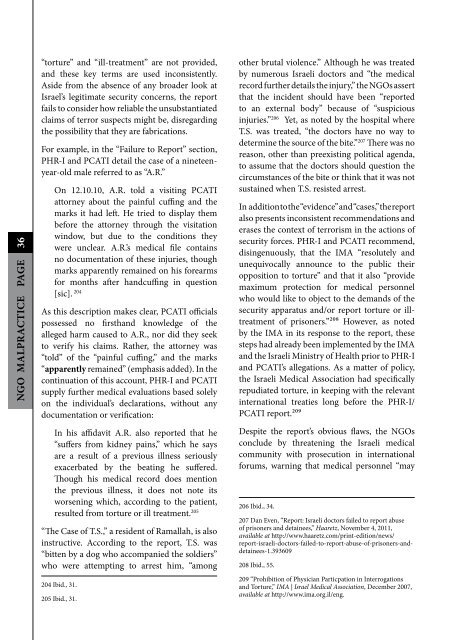NGO Malpractice
NGO_Malpractice
NGO_Malpractice
- No tags were found...
Create successful ePaper yourself
Turn your PDF publications into a flip-book with our unique Google optimized e-Paper software.
ngo malpractice page 36<br />
“torture” and “ill-treatment” are not provided,<br />
and these key terms are used inconsistently.<br />
Aside from the absence of any broader look at<br />
Israel’s legitimate security concerns, the report<br />
fails to consider how reliable the unsubstantiated<br />
claims of terror suspects might be, disregarding<br />
the possibility that they are fabrications.<br />
For example, in the “Failure to Report” section,<br />
PHR-I and PCATI detail the case of a nineteenyear-old<br />
male referred to as “A.R.”<br />
On 12.10.10, A.R. told a visiting PCATI<br />
attorney about the painful cuffing and the<br />
marks it had left. He tried to display them<br />
before the attorney through the visitation<br />
window, but due to the conditions they<br />
were unclear. A.R.’s medical file contains<br />
no documentation of these injuries, though<br />
marks apparently remained on his forearms<br />
for months after handcuffing in question<br />
[sic]. 204<br />
As this description makes clear, PCATI officials<br />
possessed no firsthand knowledge of the<br />
alleged harm caused to A.R., nor did they seek<br />
to verify his claims. Rather, the attorney was<br />
“told” of the “painful cuffing,” and the marks<br />
“apparently remained” (emphasis added). In the<br />
continuation of this account, PHR-I and PCATI<br />
supply further medical evaluations based solely<br />
on the individual’s declarations, without any<br />
documentation or verification:<br />
In his affidavit A.R. also reported that he<br />
“suffers from kidney pains,” which he says<br />
are a result of a previous illness seriously<br />
exacerbated by the beating he suffered.<br />
Though his medical record does mention<br />
the previous illness, it does not note its<br />
worsening which, according to the patient,<br />
resulted from torture or ill treatment. 205<br />
“The Case of T.S.,” a resident of Ramallah, is also<br />
instructive. According to the report, T.S. was<br />
“bitten by a dog who accompanied the soldiers”<br />
who were attempting to arrest him, “among<br />
204 Ibid., 31.<br />
205 Ibid., 31.<br />
other brutal violence.” Although he was treated<br />
by numerous Israeli doctors and “the medical<br />
record further details the injury,” the <strong>NGO</strong>s assert<br />
that the incident should have been “reported<br />
to an external body” because of “suspicious<br />
injuries.” 206 Yet, as noted by the hospital where<br />
T.S. was treated, “the doctors have no way to<br />
determine the source of the bite.” 207 There was no<br />
reason, other than preexisting political agenda,<br />
to assume that the doctors should question the<br />
circumstances of the bite or think that it was not<br />
sustained when T.S. resisted arrest.<br />
In addition to the “evidence” and “cases,” the report<br />
also presents inconsistent recommendations and<br />
erases the context of terrorism in the actions of<br />
security forces. PHR-I and PCATI recommend,<br />
disingenuously, that the IMA “resolutely and<br />
unequivocally announce to the public their<br />
opposition to torture” and that it also “provide<br />
maximum protection for medical personnel<br />
who would like to object to the demands of the<br />
security apparatus and/or report torture or illtreatment<br />
of prisoners.”208 However, as noted<br />
by the IMA in its response to the report, these<br />
steps had already been implemented by the IMA<br />
and the Israeli Ministry of Health prior to PHR-I<br />
and PCATI’s allegations. As a matter of policy,<br />
the Israeli Medical Association had specifically<br />
repudiated torture, in keeping with the relevant<br />
international treaties long before the PHR-I/<br />
PCATI report.209<br />
Despite the report’s obvious flaws, the <strong>NGO</strong>s<br />
conclude by threatening the Israeli medical<br />
community with prosecution in international<br />
forums, warning that medical personnel “may<br />
206 Ibid., 34.<br />
207 Dan Even, “Report: Israeli doctors failed to report abuse<br />
of prisoners and detainees,” Haaretz, November 4, 2011,<br />
available at http://www.haaretz.com/print-edition/news/<br />
report-israeli-doctors-failed-to-report-abuse-of-prisoners-anddetainees-1.393609<br />
208 Ibid., 55.<br />
209 “Prohibition of Physician Particpation in Interrogations<br />
and Torture,” IMA | Israel Medical Association, December 2007,<br />
available at http://www.ima.org.il/eng.


